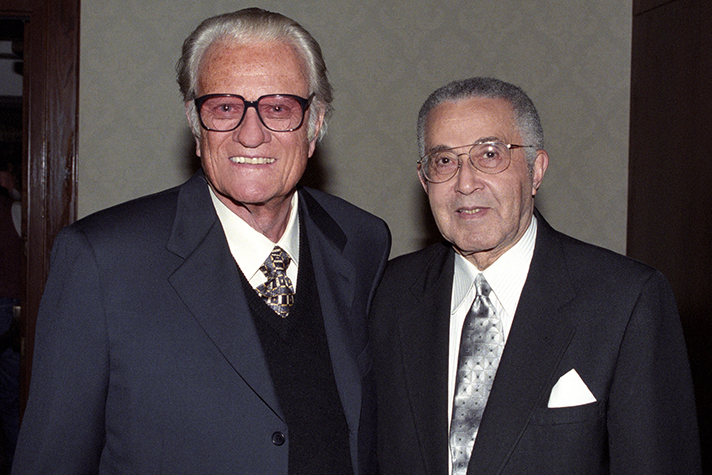
Sixty-some summers ago in New York City, a 38-year-old preacher named Billy Graham was drawing more than 20,000 people to his nightly Crusade gatherings. Newspaper headlines were complimentary. People were making decisions for Christ. But Graham personally wasn’t satisfied.
One night Graham turned to new associate Howard Jones, an African American pastor from Cleveland.
“I don’t want this to be a white man’s Crusade,” Jones remembers Graham telling him. “Howard, what must I do?”
The late Jones recounted his answer in his autobiography Gospel Trailblazer: An African American Preacher’s Historic Journey Across Racial Lines: “If they’re not coming to you, you have to go to where they are. Billy, you need to go to Harlem.”
Graham said he would.
‘No Alternative’
Seems simple enough. And for Jones and Graham it was. Plans were made. Appointments were kept. Rallies conducted.
But the year was 1957.
Following Jesus’ Example:
Jones credited Graham with following what he called “a cardinal rule of evangelism and missions: You have to go where the people are.” Citing Matthew 9, Jones explains in his autobiography how Jesus wasn’t worried about His reputation, only about people. “We can only strengthen our evangelistic efforts by following His example. And Billy did.”
At that point, the concept of legally mandated integration was only three years old. In 1954, the U.S. Supreme Court unanimously ruled that “separate but equal” was “inherently unequal” when it came to education.
The landmark Brown vs. Board of Education decision wasn’t immediately honored, though. And in 1957—toward the end of Graham’s New York Crusade—the Arkansas governor called in the National Guard to maintain segregated schools. President Dwight Eisenhower wanted to send in federal troops to ensure local compliance with integration, and he called upon Graham, who he by then unofficially counted as a spiritual advisor. Eisenhower inquired: What did Graham think?
“I think you’ve got no alternative,” came Graham’s response that he later shared in his autobiography Just As I Am. “The discrimination must be stopped.”
‘Counter-Cultural’
During the New York Crusades, Graham followed Jones’ advice. With his African American colleague, Graham—the son of a North Carolina dairy farmer—visited many minority communities near New York City. An estimated 8,000 people attended a rally in Harlem. Another 10,000 joined him in Brooklyn. At every stop, Graham invited attendees to join him in Madison Square Garden for his nightly Crusades. Jones said at the end of the 16-week Crusade—the longest evangelistic rally Graham would hold in his six-plus decades of ministry—it was estimated African Americans made up 20 percent of the crowd.
>>Read: Billy Graham’s Answers on Race & Inequality
Jones called Graham “counter-cultural” and “radical” considering the young evangelist’s personal approach to racial progress. Neither angry letters, nor scathing headlines nor anything else really seemed to faze Graham’s decisions about hiring or who he invited to the Crusade stage. In New York, Graham invited his friend Martin Luther King Jr. to pray one night during the Crusade.
“In New York, Billy once and for all made it clear that his ministry would not be a slave to the culture’s segregationist ways,” Jones wrote.
‘I’ll Never Forget It’
Graham worked behind the scenes during the Civil Rights era. He helped by paying King’s imprisonment fines. Other times, as with Eisenhower, he shared his solicited thoughts regarding racial justice.
Martin Luther King’s Prayer:
Jones said King’s prayer, shared July 18, 1957, at Billy Graham’s New York Crusade “touched Heaven.” Here’s an excerpt: “Heavenly Father, out of Whose mind this great cosmic universe has been created, we come recognizing our dependence on Thee. We stand amid the forces of truth and yet we deliberately lie. We stand amid the compelling urgency of the Lord of love as exemplified in the life of Jesus Christ, yet we live our lives so often in the dungeons of hate. For all of these sins, O God, forgive. …”
>>Read: Howard Jones: Making History for Christ
Publicly, Graham refused to preach to segregated audiences and even once tore down the dividing ropes himself in Alabama.
>> Watch: Taking Down the Ropes of Segregation
Before and after the Civil Rights Act of 1964, Graham accepted invitations to preach to integrated crowds. He addressed at least one black and white crowd in Tennessee, where some folks wondered if he’d make it out alive.
One of Graham’s preaching stops happened in Little Rock, Arkansas, in September 1959. A young boy named Bill Clinton attended one of those Crusades with his Sunday School class. Decades later, the 42nd U.S. president remembered watching the races stand together at the altar that day.
“It was the beginning of the end of the Old South in my home state,” Clinton said. “I will never forget it.”
The Real Jesus
Graham’s message never wavered, and he wrote in Just As I Am that he “expected the clergy to take the lead” on national racial healing. Graham always spoke plainly from the pulpit. In New York, he challenged the mostly white crowd one night:
“What is it in the nature of men that causes men to lie and hate and cheat, steal, lust and have pride and bigotry and intolerance and racial intolerance?” Graham asked. “What causes men to have these terrible things down inside of them?
“The problem of the world tonight is sin.”
No matter the venue, whether Graham addressed the injustice of racism nationwide or apartheid in South Africa, the solution was the same: A personal relationship with Christ.
And Graham made it very clear—Christ is accessible to all.
“Jesus was not a white man; He was not a black man,” Graham preached. “He came from that part of the world that touches Africa and Asia and Europe. Christianity is not a white man’s religion and don’t let anybody ever tell you that it’s white or black. Christ belongs to all people; He belongs to the whole world.”


